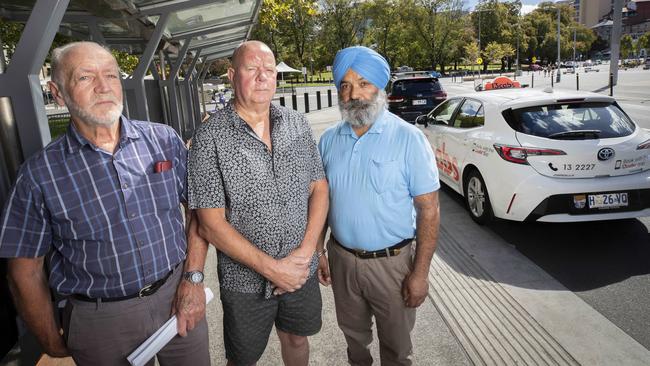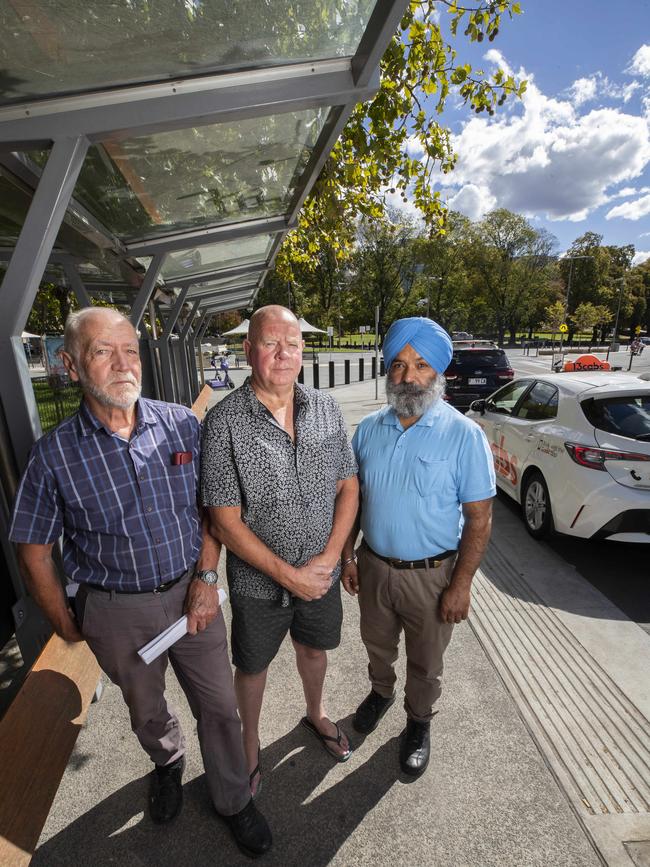Tasmanian taxi drivers want government to buy back plates after values plummet
30-years-ago a taxi plate could cost the same as a house. Now with values of the plates plummeting — taxi drivers want Tasmania to follow the lead of other states.

Tasmania
Don't miss out on the headlines from Tasmania. Followed categories will be added to My News.
When Guy Sullivan and Wim Burman bought their first taxi plates 28 years ago they cost $85,000 – almost the same as a house.
They thought they were a good investment. Now they sit gathering dust.
Endre Kovacs, the president of the Taxi Licence Owners Tasmania Association, is in a similar boat and is lobbying for Tasmania to introduce a buyback program for perpetual taxi licence plates.
“People bought these plates as their superannuation and many now in their 70s are being forced out of retirement because they don’t have enough money to live off, they have been financially and emotionally betrayed,” he said.
“They are competing against ridesharing which is unregulated and it is not a level playing field.
“Other states such as Western Australia, New South Wales and Victoria have had successful buyback programs and we should be able to get our money back and it should be adjusted for CPI.”
Mr Sullivan, who retired a month ago, has two taxi licence plates and hoped to be getting about $2000 a month income from the plates being used by other drivers.
“I’d be lucky to get $600 and they are sitting on the shelves because they’re not worth anything because there’s too many plates and then there is Uber too,” he said.

“In 1996, you could buy a house for what I paid for the plate. I borrowed to buy it and I’d been a sawmiller so I saw it as buying myself a job.
“About 17 years ago we had 206 plates in Hobart and now there’s about 500.”
Mr Burman retired eight years ago after 30 years in the taxi industry.
“My plate hangs on the wall and when I wrote to the minister he told me it wasn’t an investment, but for me it was an investment in my future.
“It’s not just about the money, it’s about the unfairness of it all when Uber is free and not regulated.”
Harjinder Grewal will soon return to taxi driving after a break to care for his father and also is upset he cannot sell his plates.
“No one is interested in buying them,” he said.
Independent Clark MP Andrew Wilkie said the taxi industry crying out for help to implement a taxi licence plate buy back scheme, which would provide much-needed financial relief to taxi plate owners.
“The oversupply of taxis and increasing competition from ride-sharing organisations, such as Uber, has meant many taxi owners and drivers are suffering,” he said.
“Indeed I continue to hear from people who paid tens of thousands for their taxi plate, but are now unable to rely on the resale of their plates to fund their retirement because the value of the plates has collapsed.
“Moreover as the value of their business has plummeted, at the same time that taxi patronage is declining, drivers are forced to work longer and longer in sometimes poorly maintained vehicles.”
Mr Wilkie said there had been positive outcomes for taxi plate owners in other states that had implemented taxi buy-back legislation.
He said the Tasmanian government continued “to kick the can down the road” leaving plate owners and drivers worried about their financial future.
A Department of State Growth spokesperson said: “Given we are still in a caretaker period we couldn’t comment as it would be a matter for an incoming government.”



